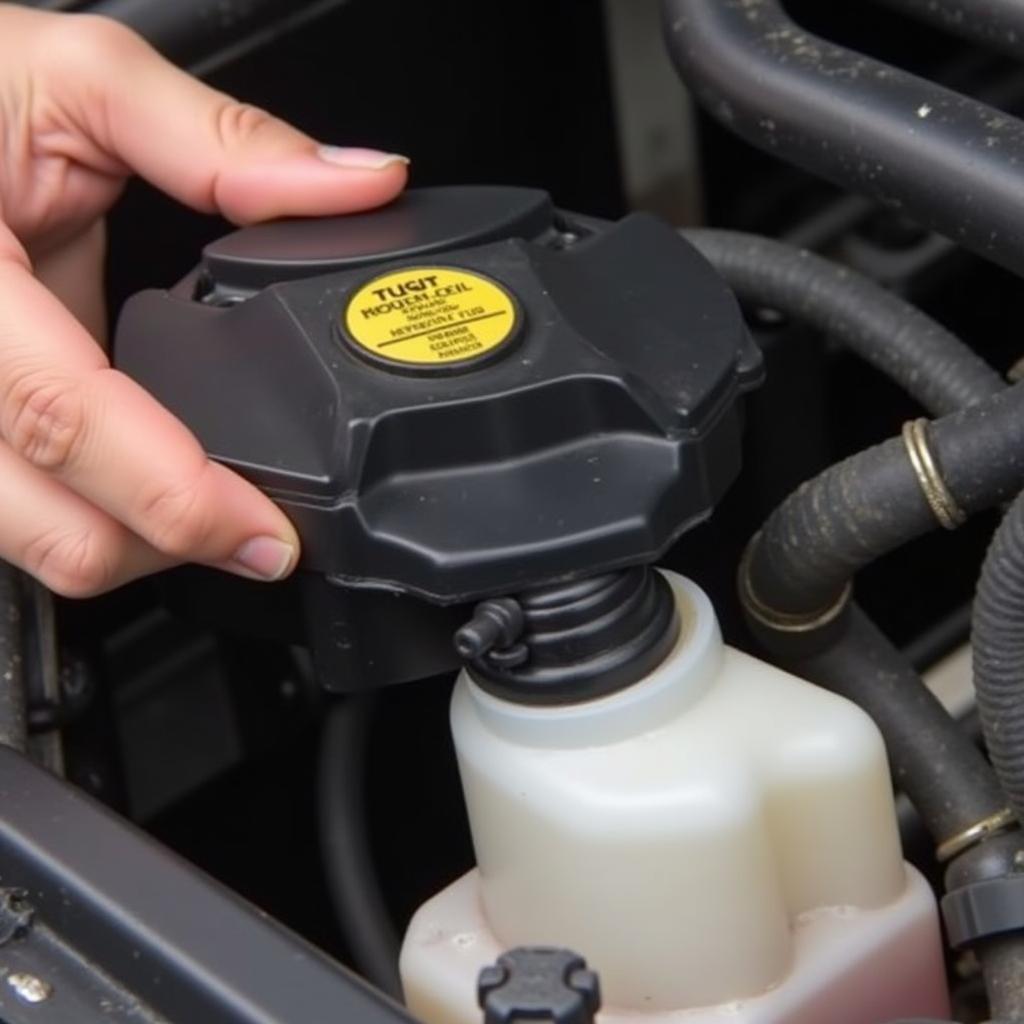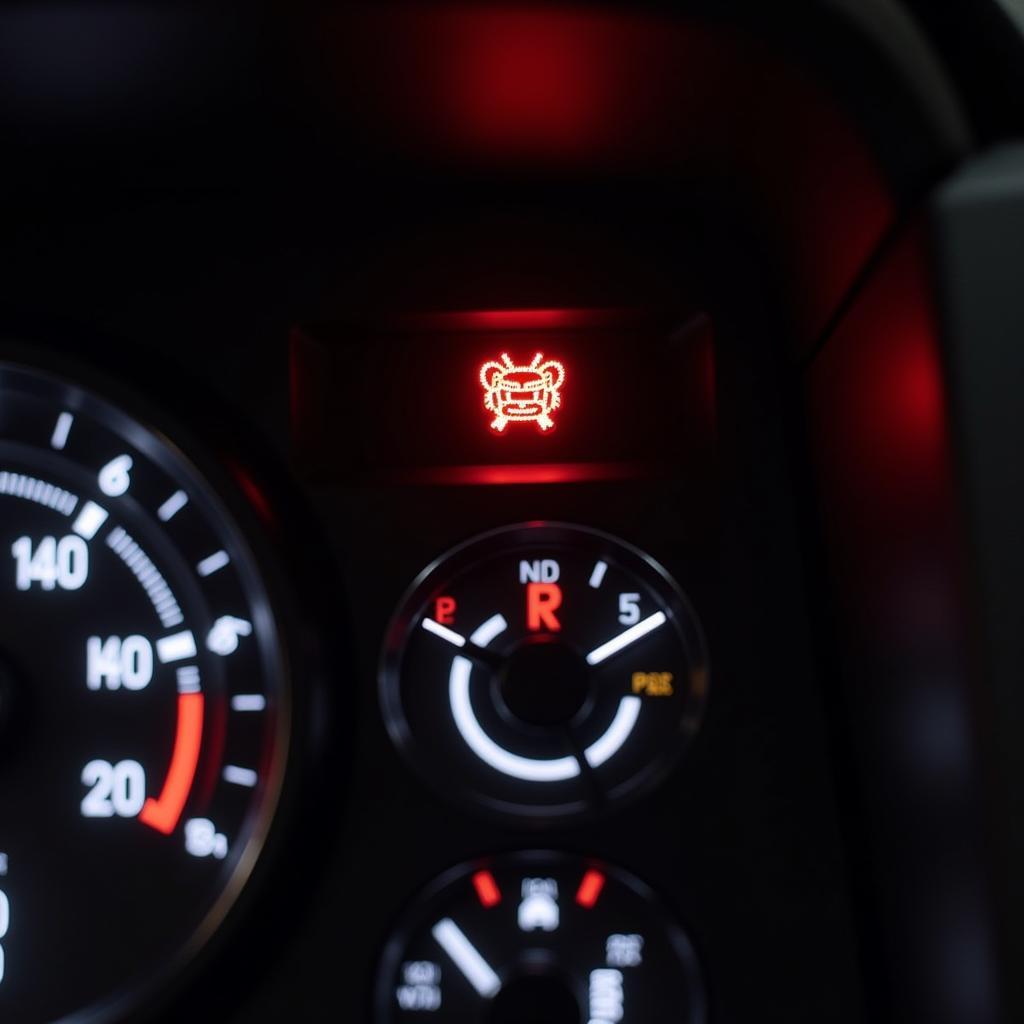If your brake warning light stays on in your Honda Accord, it can be a frustrating and concerning issue. This persistent light signals a potential problem within your braking system, demanding immediate attention to ensure your safety and prevent further damage. Understanding the various causes, diagnostic procedures, and potential solutions can empower you to address this issue effectively.
Similar to the brake warning light honda accord, various factors can contribute to this problem. Let’s explore some of the common culprits.
Common Causes of a Persistent Brake Warning Light
A glowing brake warning light can indicate several issues, ranging from simple fixes to more complex problems. Here’s a breakdown of some common causes:
Low Brake Fluid
One of the most frequent reasons for the brake warning light to stay on is low brake fluid. Brake fluid is essential for transmitting pressure from the brake pedal to the brake calipers, enabling your car to stop. A leak in the brake lines or worn brake pads can cause the fluid level to drop, triggering the warning light.
Faulty Brake Sensor
Your Honda Accord is equipped with sensors that monitor various components of the braking system. A malfunctioning sensor, particularly the low brake fluid sensor, can trigger the warning light even if the fluid level is adequate.
Worn Brake Pads
Brake pads are designed to wear down over time. When they reach a certain level of wear, a sensor within the brake pad assembly activates the warning light, indicating it’s time for a replacement.
Issues with the ABS System
The Anti-lock Braking System (ABS) is a crucial safety feature that prevents wheel lockup during hard braking. A problem within the ABS, such as a faulty sensor or module, can illuminate the brake warning light. You may notice this is similar to your anti lock brakes warning light stays on you should.
Diagnosing the Problem
Determining the exact cause of the persistent brake warning light requires a systematic approach:
-
Check the Brake Fluid Level: Open the hood and locate the brake fluid reservoir. Check the fluid level against the minimum and maximum markings. If it’s low, add the recommended brake fluid type for your Honda Accord.
-
Inspect for Leaks: Carefully examine the brake lines and calipers for any signs of leakage. Look for wet spots or dripping fluid.
-
Check the Brake Pads: Visually inspect the brake pads through the wheel spokes. If they appear thin or worn, they likely need replacement.
-
Scan for Diagnostic Trouble Codes (DTCs): A professional diagnostic scan tool can retrieve specific trouble codes stored in the vehicle’s computer, pinpointing the issue within the ABS or other brake system components. Similar to understanding the brake system warning light honda accord, a diagnostic scan is vital.
 Checking Brake Fluid in a Honda Accord
Checking Brake Fluid in a Honda Accord
Solutions and Repairs
Depending on the diagnosis, the solutions may range from simple DIY tasks to professional repairs:
-
Adding Brake Fluid: If the fluid level is low, add the correct type of brake fluid until it reaches the appropriate level. Monitor the level closely for further drops, which could indicate a leak.
-
Replacing Brake Pads: Worn brake pads require replacement to ensure optimal braking performance and safety.
-
Repairing Brake Leaks: Leaky brake lines or calipers require professional repair or replacement.
-
Addressing ABS Issues: Resolving issues with the ABS system may involve replacing sensors, the ABS module, or other related components.
Why You Should Address the Issue Immediately
Ignoring a persistent brake warning light can lead to serious consequences, including reduced braking performance, increased stopping distance, and potential brake failure. Addressing the issue promptly ensures your safety and prevents further damage to the braking system.
What if the Brake Warning Light Stays On After Repairs?
If the light remains on even after addressing the identified issues, further diagnosis may be necessary. It’s best to consult a qualified automotive technician specialized in Honda Accord brake systems. The problem might be related to the specific year of your car, for instance, if you have a 2002 model, you can refer to this resource: brake warning light 2002 accord. Similarly, for a 2004 model, this guide might be helpful: brake warning light honda accord 2004.
Conclusion
A persistent brake warning light in your Honda Accord should never be ignored. By understanding the common causes, diagnostic procedures, and solutions outlined in this guide, you can take the necessary steps to ensure your safety and maintain the optimal performance of your braking system. Don’t delay – address this issue promptly to prevent potential hazards and costly repairs.
FAQ
- What does the brake warning light mean? It indicates a potential problem with your braking system, such as low brake fluid, worn brake pads, or an ABS issue.
- Can I drive with the brake warning light on? It’s not recommended. Driving with a persistent brake warning light can be dangerous and could lead to brake failure.
- How do I check my brake fluid level? Locate the brake fluid reservoir under the hood and check the fluid level against the minimum and maximum markings.
- How often should I replace my brake pads? Brake pad lifespan varies depending on driving habits and conditions. Consult your Honda Accord’s owner’s manual for recommended replacement intervals.
- What is the ABS system? The Anti-lock Braking System (ABS) prevents wheel lockup during hard braking, improving vehicle control.
- How much does it cost to fix a brake warning light issue? The cost varies depending on the underlying cause and necessary repairs.
- Should I take my car to a mechanic if the brake warning light stays on? If you’re unable to diagnose and fix the issue yourself, it’s always best to consult a qualified automotive technician.


